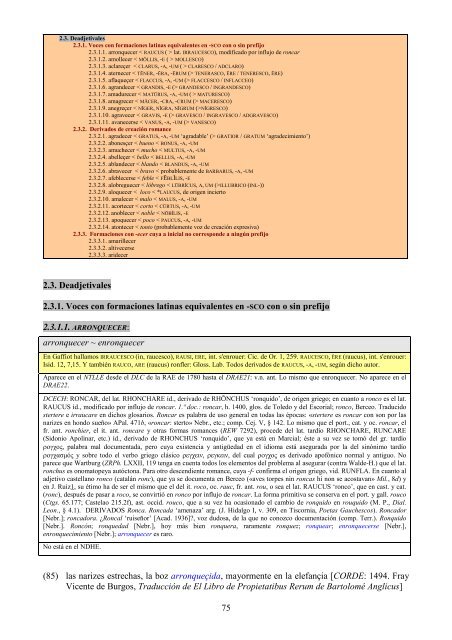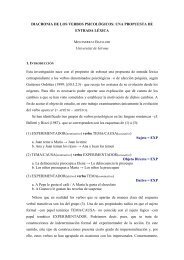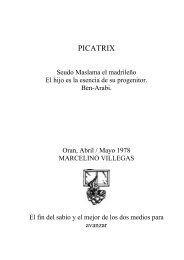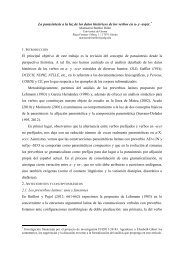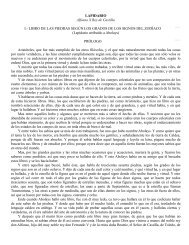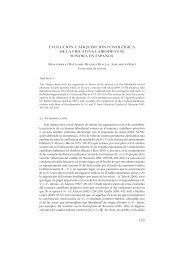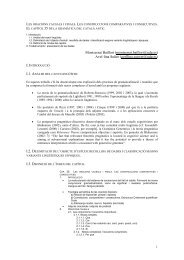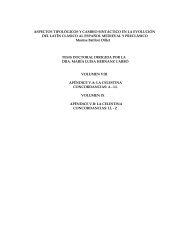Evolución e historia de los verbos con prefijo a- y ... - habilis - UdG
Evolución e historia de los verbos con prefijo a- y ... - habilis - UdG
Evolución e historia de los verbos con prefijo a- y ... - habilis - UdG
You also want an ePaper? Increase the reach of your titles
YUMPU automatically turns print PDFs into web optimized ePapers that Google loves.
2.3. Deadjetivales<br />
2.3.1. Voces <strong>con</strong> formaciones latinas equivalentes en -SCO <strong>con</strong> o sin <strong>prefijo</strong><br />
2.3.1.1. arronquecer < RAUCUS ( > lat. IRRAUCESCO), modificado por influjo <strong>de</strong> roncar<br />
2.3.1.2. amollecer < MŎLLIS, -E ( > MOLLESCO)<br />
2.3.1.3. aclareçer < CLARUS, -A, -UM ( > CLARESCO / ADCLARO)<br />
2.3.1.4. aternecer < TĔNER, -ĔRA, -ĔRUM (> TENERASCO, ĔRE / TENERESCO, ĔRE)<br />
2.3.1.5. aflaqueçer < FLACCUS, -A, -UM (> FLACCESCO / INFLACCEO)<br />
2.3.1.6. agran<strong>de</strong>cer < GRANDIS, -E (> GRANDESCO / INGRANDESCO)<br />
2.3.1.7. amadurecer < MATŪRUS, -A, -UM ( > MATURESCO)<br />
2.3.1.8. amagrecer < MĂCER, -CRA, -CRUM (> MACERESCO)<br />
2.3.1.9. anegreçer < NĬGER, NĬGRA, NĬGRUM (>NĬGRESCO)<br />
2.3.1.10. agravecer < GRAVIS, -E (> GRAVESCO / INGRAVESCO / ADGRAVESCO)<br />
2.3.1.11. avanecerse < VANUS, -A, -UM (> VANESCO)<br />
2.3.2. Derivados <strong>de</strong> creación romance<br />
2.3.2.1. agra<strong>de</strong>cer < GRATUS, -A, -UM ‘agradable’ (> GRATIOR / GRATUM ‘agra<strong>de</strong>cimiento’)<br />
2.3.2.2. abonesçer < bueno < BONUS, -A, -UM<br />
2.3.2.3. amuchecer < mucho < MULTUS, -A, -UM<br />
2.3.2.4. abelleçer < bello < BELLUS, -A, -UM<br />
2.3.2.5. ablan<strong>de</strong>cer < blando < BLANDUS, -A, -UM<br />
2.3.2.6. abravecer < bravo < probablemente <strong>de</strong> BARBARUS, -A, -UM<br />
2.3.2.7. afeblecerse < feble < FĒBLĬLIS, -E<br />
2.3.2.8. alobreguecer < lóbrego < LŪBRĬCUS, A, UM (>ILLUBRICO (INL-))<br />
2.3.2.9. aloquecer < loco < *LAUCUS, <strong>de</strong> origen incierto<br />
2.3.2.10. amalecer < malo < MALUS, -A, -UM<br />
2.3.2.11. acortecer < corto < CŬRTUS, -A, -UM<br />
2.3.2.12. anoblecer < noble < NŌBĬLIS, -E<br />
2.3.2.13. apoquecer < poco < PAUCUS, -A, -UM<br />
2.3.2.14. atontecer < tonto (probablemente voz <strong>de</strong> creación expresiva)<br />
2.3.3. Formaciones <strong>con</strong> -ecer cuya a inicial no correspon<strong>de</strong> a ningún <strong>prefijo</strong><br />
2.3.3.1. amarillecer<br />
2.3.3.2. altivecerse<br />
2.3.3.3. ari<strong>de</strong>cer<br />
2.3. Deadjetivales<br />
2.3.1. Voces <strong>con</strong> formaciones latinas equivalentes en -SCO <strong>con</strong> o sin <strong>prefijo</strong><br />
2.3.1.1. ARRONQUECER:<br />
arronquecer ~ enronquecer<br />
En Gaffiot hallamos IRRAUCESCO (in, raucesco), RAUSI, ERE, int. s'enrouer: Cic. <strong>de</strong> Or. 1, 259. RAUCESCO, ĔRE (raucus), int. s'enrouer:<br />
Isid. 12, 7,15. Y también RAUCO, ARE (raucus) ronfler: G<strong>los</strong>s. Lab. Todos <strong>de</strong>rivados <strong>de</strong> RAUCUS, -A, -UM, según dicho autor.<br />
Aparece en el NTLLE <strong>de</strong>s<strong>de</strong> el DLC <strong>de</strong> la RAE <strong>de</strong> 1780 hasta el DRAE21: v.n. ant. Lo mismo que enronquecer. No aparece en el<br />
DRAE22.<br />
DCECH: RONCAR, <strong>de</strong>l lat. RHONCHARE íd., <strong>de</strong>rivado <strong>de</strong> RHŎNCHUS ‘ronquido’, <strong>de</strong> origen griego; en cuanto a ronco es el lat.<br />
RAUCUS íd., modificado por influjo <strong>de</strong> roncar. 1.ª doc.: roncar, h. 1400, g<strong>los</strong>. <strong>de</strong> Toledo y <strong>de</strong>l Escorial; ronco, Berceo. Traducido<br />
stertere e irraucare en dichos g<strong>los</strong>arios. Roncar es palabra <strong>de</strong> uso general en todas las épocas: «stertere es roncar <strong>con</strong> son por las<br />
narizes en hondo sueño» APal. 471b, «roncar: sterto» Nebr., etc.; comp. Cej. V, § 142. Lo mismo que el port., cat. y oc. roncar, el<br />
fr. ant. ronchier, el it. ant. roncare y otras formas romances (REW 7292), proce<strong>de</strong> <strong>de</strong>l lat. tardío RHONCHARE, RUNCARE<br />
(Sidonio Apolinar, etc.) íd., <strong>de</strong>rivado <strong>de</strong> RHONCHUS ‘ronquido’, que ya está en Marcial; éste a su vez se tomó <strong>de</strong>l gr. tardío<br />
ρογχος, palabra mal documentada, pero cuya existencia y antigüedad en el idioma está asegurada por la <strong>de</strong>l sinónimo tardío<br />
ρογχασµóς y sobre todo el verbo griego clásico ρεγχειν, ρεγκειν, <strong>de</strong>l cual ρογχος es <strong>de</strong>rivado apofónico normal y antiguo. No<br />
parece que Wartburg (ZRPh. LXXII, 119 tenga en cuenta todos <strong>los</strong> elementos <strong>de</strong>l problema al asegurar (<strong>con</strong>tra Wal<strong>de</strong>-H.) que el lat.<br />
ronchus es onomatopeya autóctona. Para otro <strong>de</strong>scendiente romance, cuya -f- <strong>con</strong>firma el origen griego, vid. RUNFLA. En cuanto al<br />
adjetivo castellano ronco (catalán ronc), que ya se documenta en Berceo («aves torpes nin roncas hi non se acostavan» Mil., 8d) y<br />
en J. Ruiz1, su étimo ha <strong>de</strong> ser el mismo que el <strong>de</strong>l it. roco, oc. rauc, fr. ant. rou, o sea el lat. RAUCUS ‘ronco’, que en cast. y cat.<br />
(ronc), <strong>de</strong>spués <strong>de</strong> pasar a roco, se <strong>con</strong>virtió en ronco por influjo <strong>de</strong> roncar. La forma primitiva se <strong>con</strong>serva en el port. y gall. rouco<br />
(Ctgs. 65.177; Castelao 215.2f), ast. occid. rouco, que a su vez ha ocasionado el cambio <strong>de</strong> ronquido en rouquido (M. P., Dial.<br />
Leon., § 4.1). DERIVADOS Ronca. Roncada ‘amenaza’ arg. (J. Hidalgo I, v. 309, en Tiscornia, Poetas Gauchescos). Roncador<br />
[Nebr.]; roncadora. ¿Roncal ‘ruiseñor’ [Acad. 1936]?, voz dudosa, <strong>de</strong> la que no <strong>con</strong>ozco documentación (comp. Terr.). Ronquido<br />
[Nebr.]. Roncón; ronquedad [Nebr.], hoy más bien ronquera, raramente ronquez; ronquear; enronquecerse [Nebr.],<br />
enronquecimiento [Nebr.]; arronquecer es raro.<br />
No está en el NDHE.<br />
(85) las narizes estrechas, la boz arronqueçida, mayormente en la elefançia [CORDE: 1494. Fray<br />
Vicente <strong>de</strong> Burgos, Traducción <strong>de</strong> El Libro <strong>de</strong> Propietatibus Rerum <strong>de</strong> Bartolomé Anglicus]<br />
75


